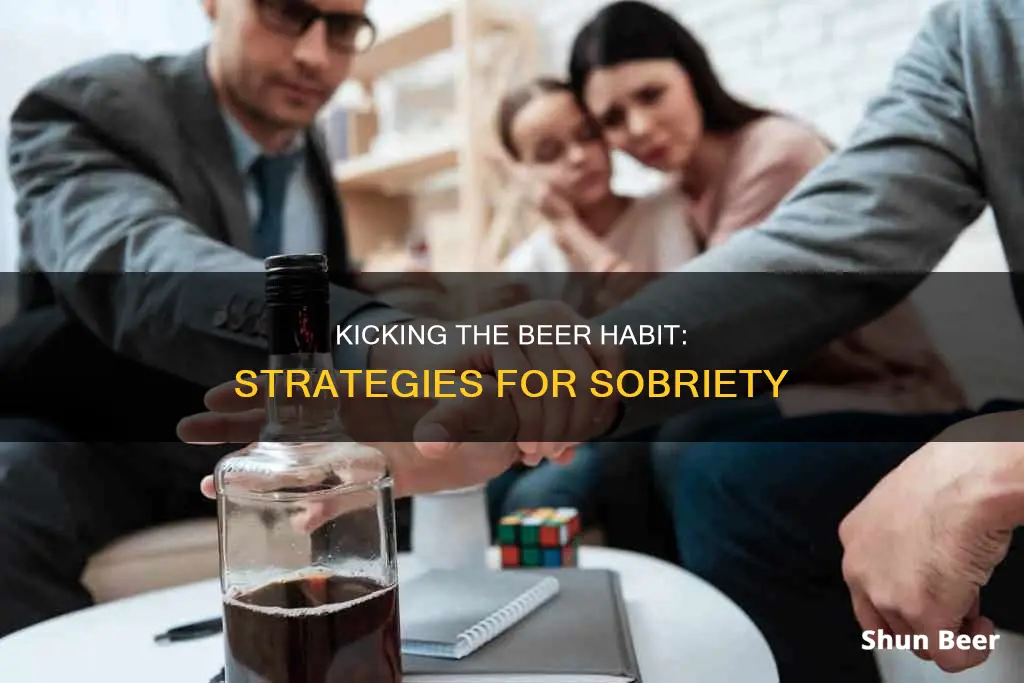
Giving up beer can be challenging, but it can be done. It's important to understand your relationship with drinking and to have a clear goal in mind. Be honest with yourself about your alcohol consumption and the reasons why you want to stop drinking beer. Do you want to improve your health, save money, or repair relationships? Write down your reasons and make a plan.
It's a good idea to consult a doctor, especially if you're a regular or heavy drinker, as quitting cold turkey can be dangerous and lead to withdrawal symptoms. Your doctor can help you create a withdrawal plan and refer you to treatment or support services. They can also advise on medication to help reduce your desire to drink.
To avoid temptation, get rid of any beer in your home and steer clear of situations or places that trigger your urge to drink. Find alternative drinks that you enjoy, such as fruit juice, herbal tea, or sparkling beverages.
Staying active and spending time with supportive people can also help. Joining a support group or reaching out to friends and family can provide encouragement and accountability.
Remember, it's okay to slip up sometimes. Be kind to yourself and focus on your long-term goal of giving up beer.
| Characteristics | Values |
|---|---|
| Reasons to stop drinking beer | To get healthier, save money, improve personal relationships and work life, or just to see if you can |
| Steps to stop drinking beer | Identify reasons for wanting to stop drinking beer, make a list of these reasons, talk to a doctor about the best way to quit, write a plan, keep track of progress, tell people you trust about your plan, get rid of beer in your home, avoid tempting situations, spend time with supportive people, stay active, replace beer with other drinks, reward yourself for not drinking beer, talk to a doctor, talk to a counsellor, join a support group, get help from friends and family |
| Benefits of stopping drinking beer | Improved mood and sleep, increased energy, improved relationships, better work performance, lower risk of long-term health problems such as cancer and heart disease |
What You'll Learn

Understand your relationship with drinking
Understanding your relationship with drinking is a key first step in giving up alcohol. This involves taking an honest look at your drinking habits and identifying why you drink.
Figure out how much you drink
You may not think you depend on alcohol, but you might be drinking more than you realise. For example, you might find it hard to stop at just one drink, or you might often lose count and end up drinking more than you intended.
Identify your triggers
Knowing why you drink is essential. Common triggers include stress, anxiety, social situations, or drinking while eating out. Becoming more aware of your triggers can help you plan ways to manage the urge to drink.
Explore the effects of alcohol on your health
Drinking alcohol can affect your health in many ways. Even moderate drinking can leave you feeling groggy, foggy, or hungover. Drinking larger amounts can lead to increased anxiety, depression, irritability, and conflict with loved ones. It can also cause serious long-term health problems, including obesity, heart disease, liver disease, and neurological problems.
Consider your approach to giving up alcohol
You might want to give up alcohol entirely, or you might prefer to cut back and develop a better relationship with alcohol. Letting others know about your choice can help keep you accountable and motivated. Family and friends can provide encouragement and support, and you might even encourage others to examine their drinking habits.
Understanding your relationship with alcohol will help you make a plan to give it up. This might involve seeking social support, practising self-care, and finding new activities to redirect your mind.
Beer Tube Screens: How Do They Work?
You may want to see also

Identify your triggers
Identifying your triggers is a crucial step in giving up drinking. A trigger is a situation or place that makes you want to drink. Knowing your triggers will help you plan ways to manage the urge to drink. Here are some tips to help you identify and deal with your triggers:
- Keep a drinking diary: Keeping a diary of your drinking habits over a week or so will give you a clear picture of your drinking. Note down the times, places, and emotions associated with your drinking. This will help you identify patterns and triggers. For example, you may find that you tend to drink more when you are feeling stressed or anxious.
- Identify your triggers: Once you have a better understanding of your drinking habits, you can start to identify your triggers. Common triggers include stress, anxiety, social situations, certain places or people, or particular times of the day. Think about the situations, emotions, or places that make you want to drink.
- Avoid triggers: Once you have identified your triggers, try to avoid them, especially in the early stages of giving up. For example, if drinking after work on Fridays is a trigger, organise to meet friends at the cinema instead. If drinking in front of the TV is a trigger, do something active instead, such as going for a walk or doing a hobby.
- Plan ahead: If you can't avoid a trigger, plan ahead. For example, if you know you will be in a situation where alcohol is available, bring a non-alcoholic drink or have an exit strategy if you feel tempted.
- Find alternative coping mechanisms: Instead of drinking to cope with emotions like anxiety or loneliness, find alternative ways to manage these feelings. This could include deep breathing, meditation, affirmations, reaching out to loved ones, or engaging in a favourite activity.
- Change your environment: Remove alcohol from your home, as having it readily available will only tempt you. Find a go-to non-alcoholic drink that you enjoy, such as flavoured soda or herbal tea.
Carmel Beach Drinking Laws: Beer and Beyond
You may want to see also

Make a plan
Making a plan is an important step in giving up drinking beer. Here are some steps to help you create an effective plan:
Identify your reasons
Start by asking yourself why you want to stop drinking beer. Are there specific health, personal, or professional reasons that are motivating you to make this change? For example, you may want to improve your health, save money, enhance your relationships, boost your energy levels, or take on a new challenge. Understanding your reasons for quitting will help you stay motivated throughout the process.
Consult a doctor
Consider consulting a doctor, especially if you drink heavily or regularly. They can assess your health, advise you on the best approach to quitting, and help you create a safe and effective plan. Quitting cold turkey may lead to withdrawal symptoms, so it's important to seek professional advice. Your doctor can also refer you to support services, monitor your progress, and help you manage any withdrawal symptoms.
Create a list of strategies
Develop a list of strategies that will help you avoid drinking beer. This may include avoiding bars or parties, getting rid of any beer in your home, spending time with supportive people who don't drink, or taking up new hobbies and activities to distract yourself. Identify your triggers and plan how you will deal with them. For example, if you usually drink after work, plan an alternative activity like going to the gym or meeting a friend for a walk.
Write down your plan
Write down the specific steps you intend to take to stop drinking beer. Make your plan visible by posting it in places you'll see it every day, such as on your fridge or bathroom mirror. Include strategies to keep yourself on track, a list of obstacles you may face, and how you will deal with those obstacles. If you plan to reduce your beer intake gradually, include a timeline and specific goals, such as cutting back to a certain number of drinks per week.
Track your progress
Keep a record of your progress and reflect on how you're doing. Note any relapses, but also celebrate your successes. If you encounter challenges or slip-ups, view them as learning opportunities rather than failures. Evaluate your progress regularly and revise your plan as needed. Remember that change takes time, and it's okay to adjust your approach as you go.
Seek support
Share your plan with people you trust, such as family, close friends, or your doctor. Their support and encouragement can help keep you accountable and motivated. Consider joining a support group or reaching out to a counsellor or therapist for additional guidance and support.
Remember, it's important to be kind to yourself throughout this process. Giving up drinking beer can be challenging, but with a well-thought-out plan and a supportive network, you can increase your chances of success.
The Best Beer to Drink: A Comprehensive Guide
You may want to see also

Get support from friends and family
Giving up alcohol can be challenging, and having a support system in place can help you stay motivated and on track. Here are some ways to get support from your friends and family:
- Share your goals and plans: Inform your loved ones about your decision to quit drinking beer. Explain your reasons and seek their encouragement and support. By involving them in your journey, you will have a built-in support system to help you stay accountable and motivated.
- Find an accountability partner: Consider asking a close friend or family member to be your accountability partner. This person can help you stay focused and provide additional support when needed. They can join you in social situations where alcohol may be present, providing extra encouragement to stick to your goals.
- Spend time with supportive people: Surround yourself with friends and family who respect your desire to give up beer. Avoid individuals who might pressure you to drink or create an unsupportive environment. Instead, seek out relationships with people who will uplift and encourage you.
- Involve them in your new hobbies: As you explore new hobbies and activities to fill your time, consider involving your friends and family. For example, you could join a fitness class with a friend or start a new hobby with a family member. This will not only help you stay busy but also strengthen your relationships and provide an additional layer of support.
- Seek their help in avoiding triggers: Discuss your triggers and weaknesses with your support system. For example, if you know that certain places or situations trigger your urge to drink, ask your friends and family to help you avoid those triggers. They can help you navigate social situations and provide alternative options for spending time together.
- Lean on them during difficult times: Quitting an addictive substance like alcohol can be emotionally challenging. During difficult times, don't hesitate to reach out to your support system. Your loved ones can provide a listening ear, offer encouragement, and remind you of your progress and achievements.
Remember, it's okay if you don't have a large support system. Even one or two supportive friends or family members can make a significant difference in your journey. Additionally, if you don't have a strong support system within your friends and family, consider seeking support from external sources, such as support groups, therapy, or counselling.
Beer and Bowel Movements: The Laxative Effect
You may want to see also

Find alternatives to drinking
Finding alternatives to drinking is a great way to help you stop drinking beer. Here are some ideas:
- Carbonated drinks: Carbonated beverages such as sparkling water with lime, lemon, ginger, or mint can give you the same fizzy sensation as beer.
- Non-alcoholic drinks: Alcohol-free beer, fruit juice, herbal tea, or sports drinks can be good alternatives to beer.
- Mocktails: Mocktails can be a fun, alcohol-free way to socialise and mingle, as they often resemble alcoholic drinks.
- Healthy alternatives: Drinking healthy alternatives like water or fruit juice can help improve your physical health.
- Hobbies: Taking up a hobby or learning a new skill can help distract you from drinking and keep you busy.
- Exercise: Exercise can be a great way to improve your physical and mental health, and it can also help distract you from drinking.
- Socialising: Socialising with supportive friends and family who respect your decision to stop drinking can help you stay motivated.
- Support groups: Joining support groups or therapy groups can provide you with a community of people who are also trying to quit drinking.
- Meditation: Meditation can help reduce stress and improve discipline and self-awareness, making it easier to resist the urge to drink.
Drinking Beer at Wegmans: What Shoppers Need to Know
You may want to see also
Frequently asked questions
If you are concerned that drinking beer may be affecting your health, talk to your doctor about it. Your doctor may be able to give you a better idea about what sort of effect the alcohol you consume is having on your body. Consider whether the amount of beer you are drinking may be affecting your work or your relationships.
Giving up drinking beer can improve your mood and sleep, increase your energy, improve your relationships with your loved ones, help you perform better at work, and lower your risk of long-term health problems such as cancer and heart disease.
Make a plan and put it somewhere you will see it every day, like on the door of your refrigerator or on your bathroom mirror. Tell people you trust about your plan so they can help keep you accountable. Get rid of any beer in your home and avoid situations where you may be tempted to drink. Stay active and spend time with supportive people.







